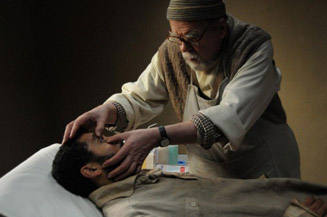Movie Review: Of Gods and Men
By Matthew Huntley
March 9, 2011
BoxOfficeProphets.com

The film is based on the monks’ final days before their real-life kidnapping and murder in 1996 by the suspected Armed Islamic Group of Algeria, a violent fundamentalist organization. At the time, Algeria was at civil war and the monks happened to find themselves in the middle of the conflict. The head of the monastery is a practical man named Christian (Lambert Wilson), who feels responsible for his brothers’ safety and well being. He does his best to reassure them of God’s love and higher purpose while using his own faith to make the right decision about whether to stay or leave, even if it’s not a popular one. Wilson, who played the cunning Merovingian in The Matrix sequels, shows here he’s also capable of great reservation and subtlety.
Without cause or provocation, members of the fundamentalist group seize the monastery and demand medical supplies and aid from Luc (Michael Lonsdale), the monastery’s doctor. But Christian stands up to them with gentle force, a tactic that would perhaps seal the brothers’ fate, although we suspect their fate was sealed long before. The film is about how these men deal with their circumstances.
Director Xavier Beauvois forgoes affectation to tell his story and instead relies on the simple, rugged mood of his location and the strength of his actors, all of whom are authentic and richly aged men, whose eyes reveal uncertainty as well as courage. These monks would never harm a soul and it is not in their nature to argue; instead, they continue to worship and accept their destinies because it means being true to their inherent principles.
There a glorious scene toward the end where only music plays and the camera subtly moves to a close-up of each man’s face. It is obviously meant to mirror one of the most significant moments in the New Testament, but it is powerful and beautifully executed. By the time it comes, these men have earned it, not because of what they’ve endured, but because they’ve come to realize their faith and spirituality are stronger and more important than their bodies.
This is not an entertaining film in the traditional sense, but poignant and reflective in retrospect. I saw it five days ago and I find myself thinking about it more and more. It is told and acted without pretension or supposition, a style that fits because, to this day, it's uncertain who exactly killed these men and why the monks decided to stay in Tibhirine when it was so dangerous. But the film’s accuracy isn’t important. What matters is the way it speaks to us about faith and whether those of us who claim to have any can maintain it when other factors in our lives remain uncertain. The film proclaims these monks did, which should serve as inspiration to the rest of us.